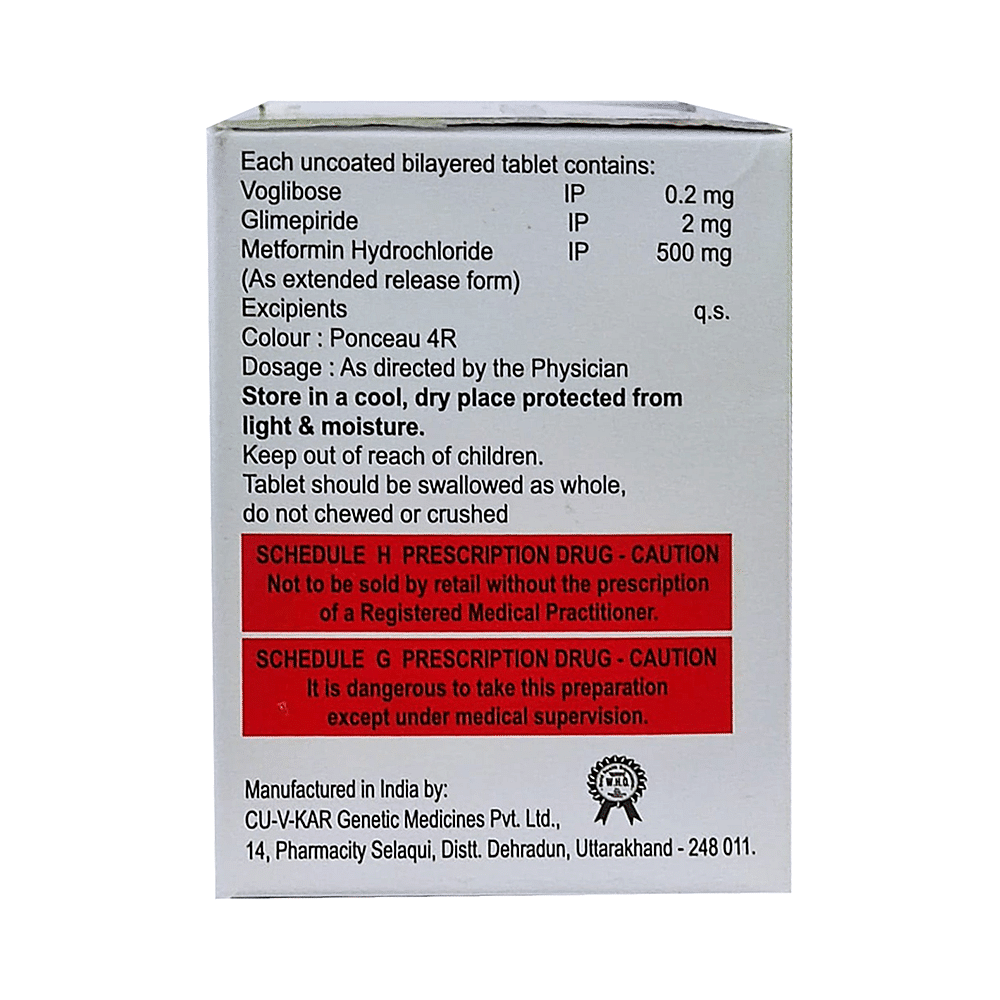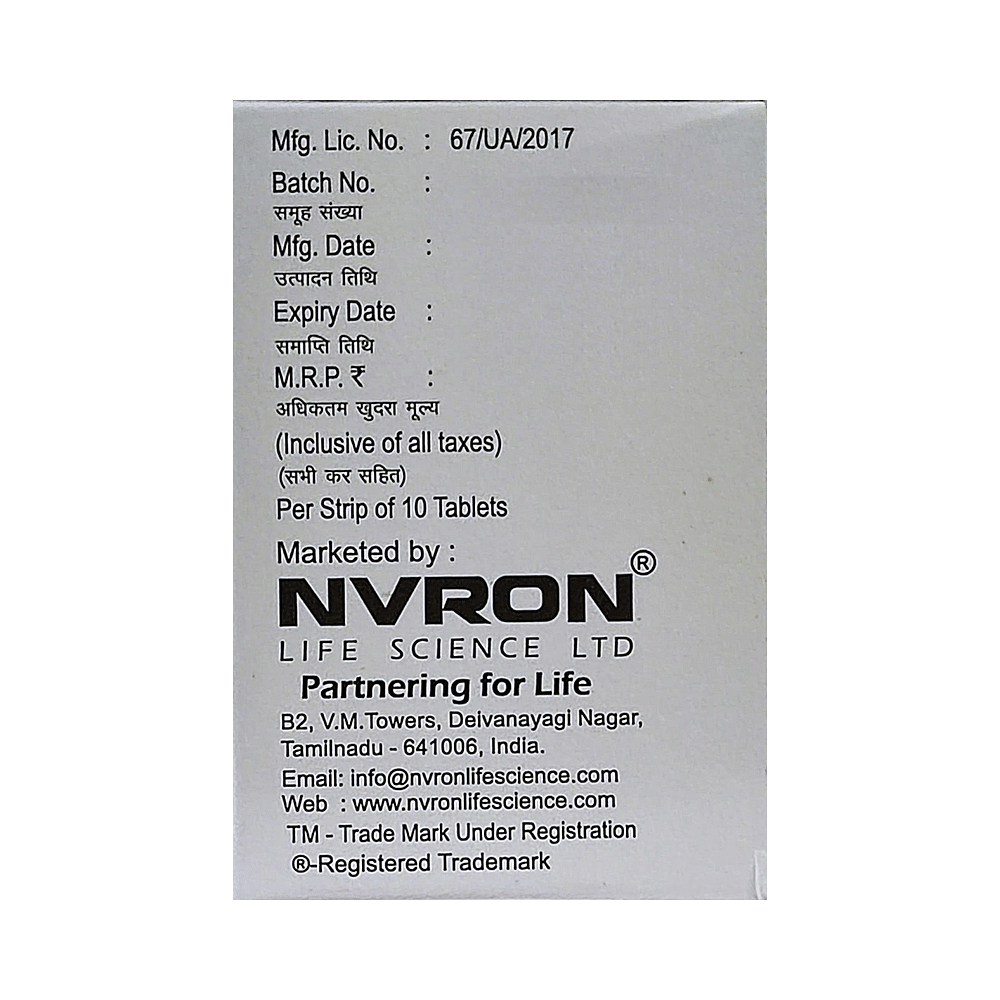


Metviron Trio 2mg Tablet
Manufacturer
Nvron Life Science Ltd
Salt Composition
Glimepiride (2mg) + Metformin (500mg) + Voglibose (0.mg)
Key Information
Short Description
Metviron Trio 2mg Tablet is a combination of three antidiabetic medicines used to treat type 2 diabetes mellitus in adults.
Dosage Form
Tablet
Introduction
Metviron Trio 2mg Tablet belongs to a category of medicines known as anti-diabetic drugs. It is a combination of medicines used to treat type 2 diabetes mellitus in adults. It helps control blood sugar levels in people with diabetes.
Directions for Use
Take this medicine in the dose and duration as advised by your doctor. Swallow it as a whole. Do not chew, crush or break it. Metviron Trio 2mg Tablet is to be taken empty stomach.
Safety Information
Side Effects
No common side effects listed.
Alcohol Warning
It is unsafe to consume alcohol with Metviron Trio 2mg Tablet.
Breastfeeding Warning
Metviron Trio 2mg Tablet is probably unsafe to use during breastfeeding. Limited human data suggests that the drug may pass into the breastmilk and harm the baby.
Pregnancy Warning
Metviron Trio 2mg Tablet may be unsafe to use during pregnancy. Although there are limited studies in humans, animal studies have shown harmful effects on the developing baby. Your doctor will weigh the benefits and any potential risks before prescribing it to you. Please consult your doctor.
How it works
Metviron Trio 2mg Tablet is a combination of three antidiabetic medicines:
Quick Tips
Take it with food to lower your chance of having an upset stomach. It can cause hypoglycemia (low blood sugar level) when used with other antidiabetic medicines alcohol or if you delay or miss a meal. Carry a sugar source with you for immediate relief. Your doctor may check your liver function regularly. Inform your doctor if you develop symptoms such as abdominal pain loss of appetite or yellowing of the eyes or skin (jaundice).
Related Medicines

Gemer V2 Tablet

Vogli-GM 2 Tablet

Tritrust V 2 Tablet

Voziglim VM 2mg/500mg/0.2mg Tablet

Triglisim 2mg/500mg/0.2mg Tablet

Trimegabose 2 mg/500 mg/0.2 mg Tablet

Eliglim MV2 Tablet

Newglim MV 2mg/500mg/0.2mg Tablet

Syzopride MV 2mg/500mg/0.2mg Tablet

Gvos M 2 Tablet
Frequently asked questions
What is Metviron Trio 2mg Tablet, and how does it help with type 2 diabetes?
Metviron Trio 2mg Tablet is a combination of three medicines: Glimepiride, Metformin, and Voglibose. It helps improve blood glucose levels in adults by increasing insulin release from the pancreas, lowering glucose production in the liver, and improving insulin sensitivity, as well as reducing postprandial glucose levels.
What are the possible side effects of taking Metviron Trio 2mg Tablet?
Common side effects include hypoglycemia (low blood sugar level), nausea, diarrhea, altered taste, flatulence, stomach pain, headache, skin rash, and respiratory tract infection.
Are there any specific conditions where I should not take Metviron Trio 2mg Tablet?
Avoid taking this medicine if you have a known allergy to its components or excipients, moderate to severe kidney disease, inflammatory bowel disease, colonic ulcerations, or underlying metabolic acidosis including diabetic ketoacidosis.
Is it safe to consume alcohol while taking Metviron Trio 2mg Tablet?
No, consuming alcohol along with this medicine may lower your blood sugar levels and increase the risk of lactic acidosis.
Can I experience hypoglycemia when using Metviron Trio 2mg Tablet?
Yes, taking this medicine can cause hypoglycemia (low blood sugar level), characterized by symptoms like nausea, headache, irritability, hunger, sweating, dizziness, fast heart rate, and feeling anxious or shaky. Regular monitoring of your blood sugar levels is essential.
What are the instructions for storing and disposing of Metviron Trio 2mg Tablet?
Store this medicine in its original packet or container, tightly closed, as per the label's storage instructions. Dispose of unused medication properly to prevent it from being consumed by pets, children, or other people.


